The Soviet composer Dimitri Shostakovich wrote most of his symphonies under Stalin. Unlike Stravinsky and Prokofiev, he stayed in the Soviet Union until his death in 1975. Shostakovich won the Stalin Prize (100,000 roubles and a dacha) six times for his compositions; addressed letters to Stalin: “Dear Joseph Vissarionovick;” and joined the Communist Party (in 1960).
Musicologists and music critics are divided into two camps regarding Shostakovich’s political leanings. One group views him as a closet dissident and the other, as a Soviet apologist and committed communist.
In addition to his 15 symphonies, Shostakovich wrote 15 string quartets; 2 concertos each for piano, violin, and cello; 2 operas, The Nose and Lady Macbeth of the Mtsensk District; 3 ballets; and other music, including 36 film scores—a Hamlet and King Lear among them.
One chamber work, Six Romances on Verses by English Poets, op. 62, written for bass and piano, also for bass and chamber orchestra, all by itself, defines Shostakovich’s politics. He composed six songs to poems by Walter Raleigh; Robert Burns (2); a folklore text titled “Royal Campaign;” and Sonnet No. 66 from Shake-speares Sonnets by William Shakespeare. (Boris Pasternak translated these verses into Russian.) With 154 sonnets to choose from Shostakovich chose Sonnet No. 66 for one of the “Six Romances [Songs].” Shakespeare makes this declaration in sonnet No. 66, (line 9):
“And art made tongue-tied by authority”
Dmitri Dmitriyevich Shostakovich garnered international fame with his First Symphony, op. 10, premiered in 1926 when he was 19 years old. His opera Lady Macbeth of Mtsensk, in 1934, was wildly popular. It ran for two years, until Stalin saw it. He walked out, and a week later Pravda declared Lady Macbeth “muddle instead of music,” with the unsigned editorial threatening “it could end very badly.” All productions of it (in Russia) were immediately cancelled. It had been performed 83 times in Leningrad; 97, in Moscow; and staged in Europe, South America, and the U.S. (in three cities).
Stalin tongue-tied Shostakovich’s art. Composers in the Soviet Union were coerced to write music extolling socialist realism and to eschew formalism—dissonant, out-of-touch, hard to understand music.
 Shostakovich: A Life R...
Best Price: $14.95
Buy New $44.39
(as of 10:10 UTC - Details)
Shostakovich: A Life R...
Best Price: $14.95
Buy New $44.39
(as of 10:10 UTC - Details)
Stalin’s censure of Lady Macbeth of Mtsensk heralded the onset of the 1936-1938 Great Terror. Over a two-year period, Soviet officials, on Stalin’s orders, executed 700,000 people. Another 700,000 to 1 million people were sent to the Gulag Archipelago’s freezing Siberian labor camps where many perished
Dmitri Dmitriyevich feared arrest as a “58er” (a political prisoner) and going to a labor camp in the Gulag. Or worse, shot, as happened to his colleague and friend Ysevold Meyerhold, the avant-garde theater director and his wife; and to his fan and advocate (with Stalin) Marshall Mikhail Turkhachevsky, Chief of Staff of the Red Army, who was arrested, convicted of “treason,” and shot. (Shostakovich dedicated his 4th Symphony to him). Three out of the 5 marshals in the army, including Turkhachevsky, and 13 out of the 15 army generals were executed in the Great Terror. Many of Shostakovich’s friends and relatives vanished in 1936 and 1937. Shostakovich kept a packed bag on hand to take with him when the authorities came to arrest him.
Shostakovich regained favor in 1937 with his Symphony No. 5, op. 47, helped by a journalist who convinced him to subtitle the symphony “A Soviet artist’s reply to just criticism.”
During the war years Dmitri Dmitriyevich Shostakovich became revered worldwide, especially for his Symphony No. 7 Leningrad, op. 60. (That put him on the cover of Time Magazine.) But after the war, in 1948, Stalin once again turned against him and banned his music. (Had Shostakovich become too popular?)
To safeguard his survival and gain more artistic freedom Dmitri Dmitriyevich played the fool, like the truth-telling fools in Shakespeare’s plays—a Yurodivy, in this case a fool-for-music who “played the fool, while actually being a persistent exposer of evil and injustice.”
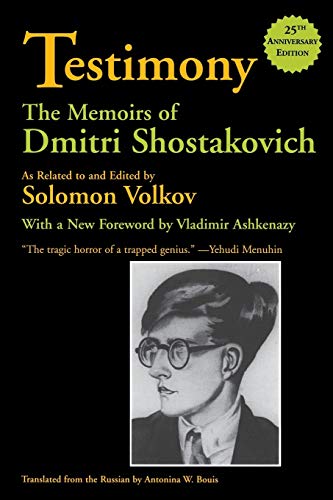 Testimony: The Memoirs...
Best Price: $8.69
Buy New $15.45
(as of 10:00 UTC - Details)
Testimony: The Memoirs...
Best Price: $8.69
Buy New $15.45
(as of 10:00 UTC - Details)
For his important Symphony No. 9, op. 70 (1945), everyone expected Shostakovich to compose a Beethoven-esque “Ode to Joy” 9th symphony celebrating the Soviet victory over the Nazis and glorifying Stalin. But Shostakovich’s 9th is only 24-minutes long. It is a boisterous, pokerfaced satire described as “what is called giving the finger in the pocket.” (This quote is from “The War Symphonies: Shostakovich Against Stalin,” a review of “A film by Larry Weinstein.”) In his First Cello Concerto, op. 107 (1959), Shostakovich quotes and ridicules the old Georgian tune “Suliko, Stalin’s favorite song.
Shakespeare’s artistic freedom was similarly compromised in 16th century England.
Evidence mounts proving that William Shakespeare was a pen name, a pseudonym, like Mark Twain for Samuel Clemens and George Eliot for Mary Ann Evans. It turns out that the poet and playwright writing under the name William Shakespeare—or Shake-speare—was a high-ranking nobleman, Edward de Vere, 17th Earl of Oxford. He was the top earl of the realm with a 500-year history dating back to the Norman Conquest, a multilingual polymath who was the Leonardo da Vinci of the English Renaissance, and Queen Elizabeth’s lover.
(The academic establishment tries to ignore the Shakespeare Authorship Question. When confronted, professors summarily dismiss evidence proving that Edward de Vere was the author of the Shakespeare canon and refuse to carefully consider it.)
Scholars on both sides of the Shakespeare Authorship Question—Stratfordians and Oxfordians—think that Shake-speares Sonnets addresses a love triangle involving the POET, Shakespeare; the FAIR YOUTH, generally agreed to be Henry Wriothesley, 3rd Earl of Southampton; and the DARK LADY. Independent scholar Hank Whittemore proves that Queen Elizabeth is the Dark Lady. He shows that the main story of the Sonnets is the 1601 Essex Rebellion and its aftermath. The Sonnets are an autobiographical account of this real-life event. The “triangle” is a family one, where the Fair Youth is Queen Elizabeth’s son, Henry, and thus the Tudor heir to the throne as Henry IX. Edward de Vere is Henry’s father.
 The Noise of Time: A N...
Best Price: $2.38
Buy New $7.00
(as of 10:00 UTC - Details)
The Noise of Time: A N...
Best Price: $2.38
Buy New $7.00
(as of 10:00 UTC - Details)
Elizabeth’s son Henry was co-leader of the Essex Rebellion, imprisoned, and sentenced to death along with Robert Devereux, its leader. He was promptly beheaded. Five other conspirators were also executed—2 beheaded and 3 hanged.
With a firm grip on state power, Elizabeth’s minister Robert Cecil agreed to cancel Henry’s planned execution, release him from the Tower and restore his title and estates if de Vere would agree to remain anonymous, both as the author Shakespeare and Henry’s biologic father. But Henry also had to agree not to make any future claims to the throne.
Upon Queen Elizabeth’s death Robert Cecil installed the more malleable Stuart James VI of Scotland as King James I of England. Ever vengeful, Cecil destroyed all records of de Vere’s life and literary genius, including his private papers, personal letters, and all documents to do with his plays. Robert Cecil sought to airbrush Edward de Vere out of history, which lasted 300 years. Until 1920, when an independent scholar in England named Thomas Looney (pronounced “Low-knee’) discovered the true author, in “Shakespeare” Identified in Edward De Vere Seventeenth Earl of Oxford. (Novelist John Galsworthy called Looney’s book “the greatest detective story of all time.”)
I address this subject in more fully in a 5,000-word essay “State Power and Shakespeare: Fake News Disguising its True History” on LewRockwell.com. It contains some of the PowerPoint slides I used for a lecture I gave with the same title last year, available on YouTube here.
“William Shakespeare” skirted the strictures the Elizabethan state imposed on his artistic freedom. After his death in 1604, Edward de Vere’s extended family helped publish, in 1609, the controversial and confiscated Shake-speares Sonnets and then the First Folio in 1623 containing 36 plays, half of them in the Folio published for the first time.
Dmitri Dmitriyevich Shostakovich confronted and worked around the restrictions the Stalinist state imposed on his artistic freedom. (He first made ends meet working as a cinema pianist accompanying silent movies on his way to becoming an acclaimed composer.)
Like Shakespeare has been in literature for the last four centuries, Shostakovich is arguably the greatest composer of the 20th century and shorn of communist leanings appreciation of his works will likely continue to grow in this one.
Recommended Reading
On Shostakovich
Shostakovich: A Life Remembered (2006, 537 pp.) Second Edition by Elizabeth Wilson. A documentary biography containing interviews with the composer’s friends, colleagues, and family members. This is the most important English-language book about Shostakovich so far.
Testimony: The Memoirs of Dmitri Shostakovich (1979, 276 pp.) by Solomon Volkov. Critiqued by musicologists in the West, Shostakovich’s son and daughter confirm the validity of these memoirs and say they are true and accurate and that was the way it was.
The Noise of Time: A novel by Julian Barnes (2016, 201 pp.) An engrossing paperback 197-page portrait of Shostakovich by an acclaimed author.
The Gulag Archipelago by Alexandr Solzhenitsyn (1975, 3 volumes, 1716 pp.) To learn the true history of the USSR and best understand Shostakovich, one must read this book.
On Shakespeare
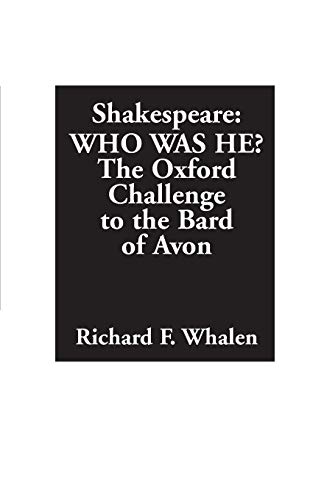 Shakespeare--Who Was He?
Best Price: $15.99
Buy New $20.00
(as of 10:30 UTC - Details)
Shakespeare--Who Was He?
Best Price: $15.99
Buy New $20.00
(as of 10:30 UTC - Details)
Shakespeare: WHO WAS HE? The Oxford Challenge to the Bard of Avon (1994, 170 pp.) by Richard Whalen. A concise, well written, and evenhanded presentation of the evidence showing that Edward de Vere, the Earl of Oxford was the genuine author of the Shakespeare canon. My path to becoming an Oxfordian began in 1995 when I came upon and read this book.
The Man who was Never SHAKESPEARE (2011, 380 pp.) by A. J. Pointon. The best biography of Stratford-upon-Avon’s William Shaksper/Shakespeare, a successful businessman.
The Shakespeare Guide to Italy: Retracing the Bard’s Unknown Travels (2011, 297 pp.) by Richard Paul Roe. “Smoking gun” evidence that Edward de Vere is William Shakespeare.
Malice Aforethought: The Killing of a Unique Genius (2010, 395 pp.) by Paul Hemenway Altrocchi. A great read, fascinating, very informative and true.
100 Reasons Shake-speare was the Earl of Oxford (2016, 351 pp.) by Hank Whittemore. He nails it! He proves beyond a reasonable doubt de Vere is Shakespeare.
Shakespeare’s Son and his sonnets (2010, 197 pp.) by Hank Whittemore. An expanded introduction to The Monument. A good place to start.
The Monument (2005, 860 pp.) by Hank Whittemore. The complete, new paradigm of Shake-speares Sonnets. In all its magnificence.
Hidden in Plain Sight: The True History Revealed in Shake-speares Sonnets. Second Edition (Revised). (2016, 363 pp.) Rush explains well the Monument Paradigm for the general reader and further develops it. Highly recommended.
A Poet’s Rage: Understanding Shakespeare through authorship studies. (2013, 257 pp.) William Boyle, Editor. Eleven essays and two appendices on the Tudor Heir (Prince Tudor) theory and the Monument. The essay by William Boyle, “Unveiling the Sonnets” is excellent and worth the price of the book.
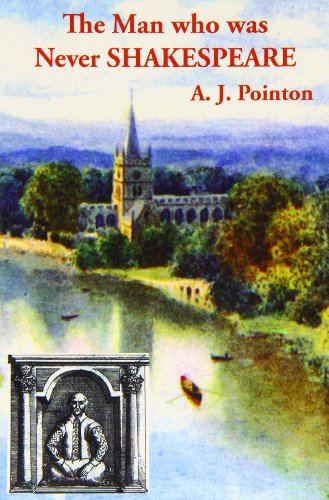 The Man Who Was Never ...
Best Price: $17.98
(as of 12:05 UTC - Details)
The Man Who Was Never ...
Best Price: $17.98
(as of 12:05 UTC - Details)
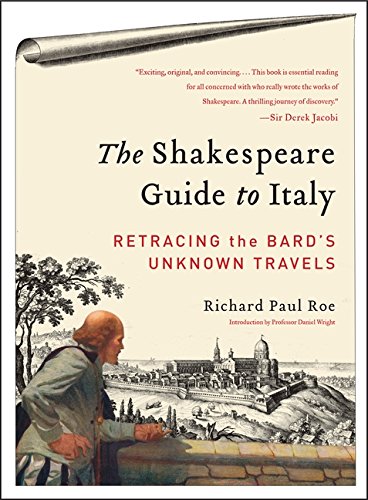 The Shakespeare Guide ...
Best Price: $2.97
Buy New $12.48
(as of 10:00 UTC - Details)
The Shakespeare Guide ...
Best Price: $2.97
Buy New $12.48
(as of 10:00 UTC - Details)
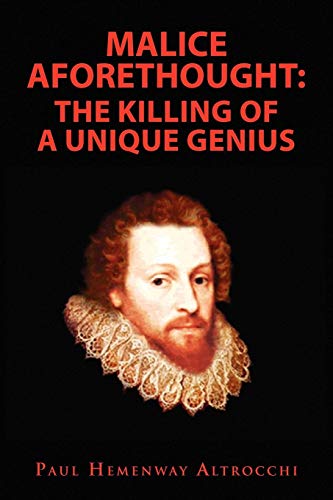 MALICE AFORETHOUGHT: T...
Best Price: $10.24
Buy New $18.97
(as of 10:00 UTC - Details)
MALICE AFORETHOUGHT: T...
Best Price: $10.24
Buy New $18.97
(as of 10:00 UTC - Details)
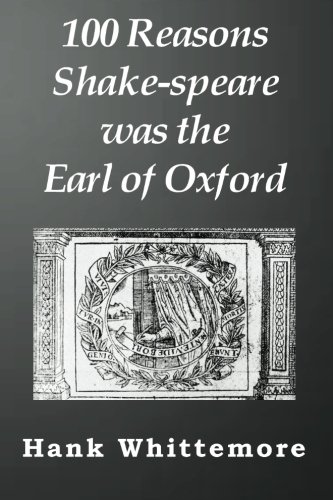 100 Reasons Shake-spea...
Best Price: $15.57
Buy New $19.95
(as of 10:53 UTC - Details)
100 Reasons Shake-spea...
Best Price: $15.57
Buy New $19.95
(as of 10:53 UTC - Details)
 Shakespeareu2019s Son ...
Best Price: $9.98
Buy New $14.95
(as of 12:25 UTC - Details)
Shakespeareu2019s Son ...
Best Price: $9.98
Buy New $14.95
(as of 12:25 UTC - Details)
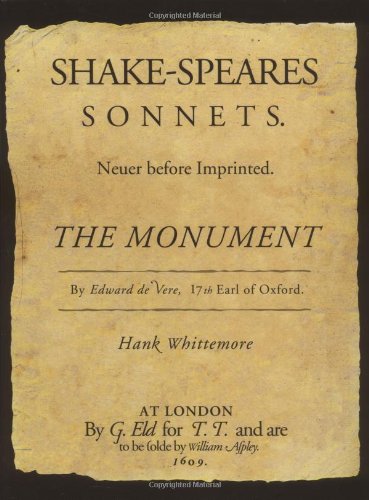 The Monument: u2019Sha...
Best Price: $70.48
Buy New $75.00
(as of 02:05 UTC - Details)
The Monument: u2019Sha...
Best Price: $70.48
Buy New $75.00
(as of 02:05 UTC - Details)
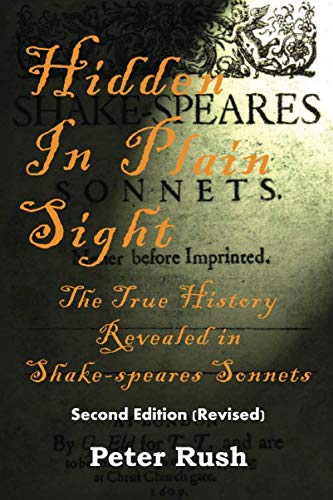 Hidden In Plain Sight:...
Best Price: $13.55
Buy New $13.61
(as of 02:10 UTC - Details)
Hidden In Plain Sight:...
Best Price: $13.55
Buy New $13.61
(as of 02:10 UTC - Details)
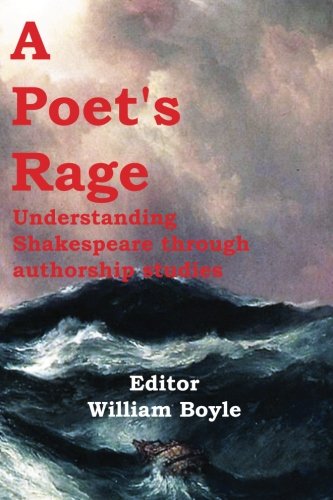 A Poetu2019s Rage: Und...
Best Price: $6.81
Buy New $14.95
(as of 02:10 UTC - Details)
A Poetu2019s Rage: Und...
Best Price: $6.81
Buy New $14.95
(as of 02:10 UTC - Details)






